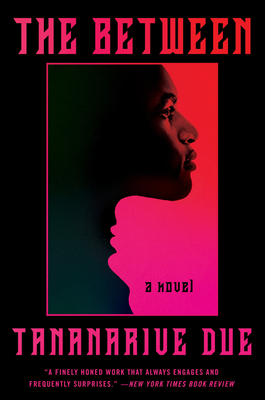THE BETWEEN follows the story of Hilton, a young boy who discovers his grandmother’s cold, dead body lying on the kitchen floor. When he returns with help, she’s alive but something just isn’t the same. The story picks up thirty years in the future—Hilton is married with kids and running a successful rehab center. But when his wife, a newly elected judge, receives racially charged threats, Hilton’s perfect life starts to flip upside down. Hilton’s nightmares return. He’s barely getting any sleep, his memories are fading, his relationships begin to fall apart. The line between reality and nightmares blurs…and Hilton’s mind begins to unravel.
Read chapter one below.

Hilton was seven when his grandmother died, and it was
a bad time. But it was worse when she died again.
Hilton called her Nana, but her real name was Eunice
Kelly. She raised Hilton by herself in rural Florida, in Belle
Glade, which was forty miles from Palm Beach’s rich white
folks who lived like characters in a storybook. They shared
a two-room house with a rusty tin roof on a road named for
Frederick Douglass. The road wasn’t paved, and the stones
hurt Hilton’s tender feet whenever he walked barefoot. Douglass
Road was bounded by tomato fields behind an old
barbed wire fence Nana told him never to touch because he
might get something she called tetanus, and they couldn’t
afford a doctor. Hilton knew they were poor, but he never
felt deprived because he had everything he wanted. Even as
young as he was, Hilton understood the difference.
Nana had been a migrant worker for years, so she had
muscles like a man on her shoulders and forearms. Nana always
saved her money, and she played the organ for pay at
the church the monied blacks attended across town, so she
hadn’t harvested sugarcane or picked string beans alongside
the Puerto Ricans and Jamaicans in a long time.
Hilton worshipped her. She was his whole world. He
didn’t know anything about his parents except that they were
gone, and he didn’t miss them. He didn’t think it was fair to
his friends that they had mamas and daddies instead of a
Nana.
Nana always said she didn’t intend for Hilton to end up
in the fields, that there were bigger things in store for him,
so she sent him to school instead. She’d taught him to read
before he ever walked through the doorway of the colored
school a half mile away. And it was when he came home
from school on a hot May afternoon that his life was
changed forever.
He found Nana sprawled across her clean-swept kitchen
floor, eyes closed, a white scarf wrapped around her head.
She wasn’t moving, and not a sound came from her. Hilton
didn’t panic just yet because Nana was old and sometimes
fainted from heat when she tried to act younger, so he knelt
beside her and shook her, calling her name. That worked by
itself sometimes. Otherwise, he’d need to find her salts. But
when he touched her forearm, he drew his hand away with a
cry. Even with the humidity in the little house and the steam
from pots boiling over on top of the stove, their lids bouncing
like angry demons, Nana’s flesh felt as cold as justdrawn
well water. As cold as December. He’d never touched
a person who felt that way, and even as a child he knew only
dead people turned cold like that.
Hilton stumbled to his feet and ran crying outside to find
a grown-up who could help. He was only half seeing because
of his tears, banging on door after door on Douglass
Road, yelling through the screens, and finding no one home.
After each door, his sobs rose higher and his throat closed
up a little more tightly until he could barely breathe. It was
as though everyone were simply gone now, and no one was
left but him. He felt like he’d tried a hundred houses, and all
he’d found was barking dogs. The barking and running
made him feel dizzy. He could hardly catch his breath anymore,
like he would die himself.
In truth, there were only six houses on Douglass Road.
The last belonged to Zeke Higgs, a Korean War veteran
angry with middle age, angry with white folks, and whom
no child with sense would bother on any other day because
he kept a switch by his door. Zeke appeared like a shadow
behind his screen when Hilton came pounding and crying,
“Nana’s dead. Come help Nana.” Zeke scooped Hilton under
his arm and ran to the house.
When he got home, Hilton’s childhood flew from him.
Nana was no longer lying lifeless on the kitchen floor. She
was standing over the kitchen stove, stirring pots, and the
first thing she said was: “I wondered where you’d run off to,
boy.” She looked at Zeke’s face and nodded at him, then she
fixed her eyes on Hilton. “I’m ’fraid Nana’s made a mess of
supper, Hilton. Just a mess.”
“You all right, Mrs. Kelly?” Zeke asked, studying her
face. Hilton did the same. She was perspiring, and her
cheeks were redder than usual underneath her thin cocoacolored
skin.
“Just fine. May have had a fainting spell is all. I hope
Hilton didn’t send you into a fright.”
Zeke mumbled something about how it wasn’t a bother,
although he was annoyed. Hilton barely noticed Zeke slip
back out of the house because his eyes were on Nana. His
tiny hand still tingled from the memory of the cold flesh
he’d touched, as unhuman as meat from the butcher. Nana’s
smiles and gentle manner frightened him in a way he didn’t
understand. He stood watching her, his tears still flowing.
Nana glanced at him several times over her shoulder
while she tried to scrape burned stew from the bottom of her
good iron saucepan. The scraping sounded grating and insistent
to Hilton. For the first time in his life, Hilton wondered
if Nana might ever do anything to try to hurt him.
Finally, Nana said, “You go on out of the way now,
Hilton. Supper’s late today. Don’t give me that face now,
pumpkin. Nana’s not going to leave you.”
Hilton wanted to take Nana’s fingers and squeeze them,
to see if the cold was still there, but she hadn’t reached out
to him and he wouldn’t dare touch her if she did. Hilton felt
something had changed, maybe forever. He went outside to
play with a three-wheeled wagon he’d found, but he wasn’t
really playing.
Award-winning author and Black Horror scholar Tananarive Due’s 1995 debut novel, THE BETWEEN is being reissued with a new foreword by the author as well as, for the first time ever, in digital audio. Due, a leading voice in Black speculative fiction, is an executive producer on Shudder’s groundbreaking documentary Horror Noire: A History of Black Horror and developed a course at UCLA called “The Sunken Place: Racism, Survival, and The Black Horror Aesthetic” after the release of Jordan Peele’s Get Out. This reissue, like Due’s overarching work, comes at a time when Black-centered speculative fiction is reinventing how we understand traditional genres.
From the book The Between by Tananarive Due. Copyright (C) 2021 by Tananarive Due. Published by Harper Perennial, an imprint of HarperCollins Publishers. Reprinted by permission.









